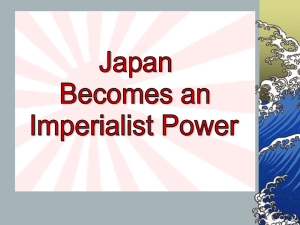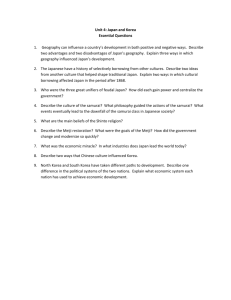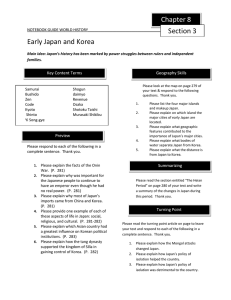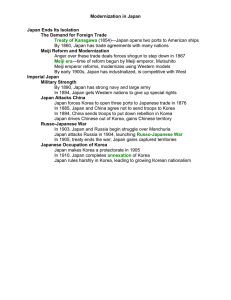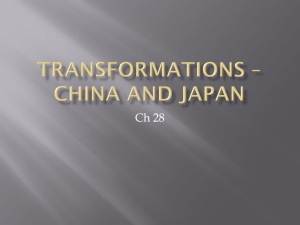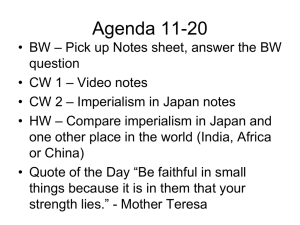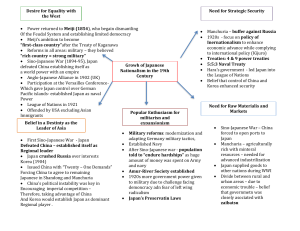File
advertisement
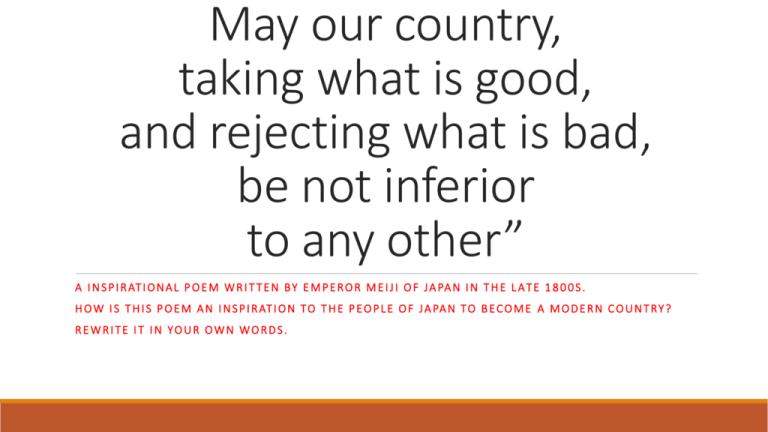
May our country, taking what is good, and rejecting what is bad, be not inferior to any other” A I N S P I R AT I O N A L P O E M W R I T T E N B Y E M P E R O R M E I J I O F J A PA N I N T H E L A T E 1 8 0 0 S . H O W I S T H I S P O E M A N I N S P I R AT I O N TO T H E P E O P L E O F J A PA N TO B E C O M E A M O D E R N C O U N T R Y ? REWRITE I T I N YOUR OWN WORDS. Background Tokugawa family take power over Japan in 1603 Closed Japan to travel overseas Nagasaki only port open; very limited trade and only w/ Dutch 200+ years Japan in isolation Resorted to old ways of life while rest of world was developing Discontent throughout Japan Contact with America News of British victory in Opium War and the treaties enforced on China reached Japan July, 1853, American Commodore Matthew Perry sailed into Tokyo Commodore Perry brings with him a four warships, including two steam frigates. The two letters With Perry’s ships came a letter from the President The Japanese, needless to say, didn’t welcome the United States or what she brought with her Commodore Perry’s letter Pull out the sheet we worked on Wednesday/Thursday (depending on what class period) List the Characteristics of what you think makes up a modern nation (think about the U.S. and similar countries) The Meiji Restoration “A rich Country, a strong Military” Study Western Ways. Adapt what we like. Don’t have to give into Western demands Members of Gov’t and young Samurai sent abroad to study The Charter Oath of 1868 By this oath we set up as our aim the establishment of the national weal on a broad basis and the framing of a constitution and laws. 1. Deliberative assemblies shall be widely established and all matters decided by public discussion. 2. All classes, high and low, shall unite in vigorously carrying out the administration of affairs of state. 3. The common people, no less than the civil and military officials, shall each be allowed to pursue his own calling so that there may be no discontent. 4. Evil customs of the past shall be broken off and everything based upon the just laws of Nature. 5. Knowledge shall be sought throughout the world so as to strengthen the foundations of imperial rule.* Gov’t Meiji Constitution All are equal before law Emperor= Absolute power Satsuma Rebellion 1877 Legislature- bi-cameral ( 1 house elected and 1 house appointed) Western Style bureaucracy Different depts. Supervise areas of gov’t Ended Special privilege of Samurai to strengthen military All men subject to military service Industrialization Modernization….now Imperialism Korea: tributary state of China ◦ Tributary: recognizes supremacy of stronger state, but still independent Korea had shut its doors to foreigners (except china and japan) Chinese power declines, Russian and Japan eye Korea 1876: Japan forces Korea to open ports st 1 Sino(“Chinese”)-Japanese War 1894, Japan wins easily Gain ports in China and control over Taiwan Russo-Japanese War Japan wins again!!! Defeats troops in Manchuria Destroys whole Russian Fleet 1905 Treaty of PortsmouthJapan now controls Korea and rights in parts of Manchuria Japan’s rule over Korea for 35 years! POSITIVES NEGATIVES Set to modernize Harsh on the people Build railroads, factories, communications Set out to erase Korean language/ identity Produced more rice than ever before Korean nationalism will rise 1919; nonviolent protest is suppressed w/violence ◦ Encourages nationalism In reality, this all benefited Japan more than Korea
